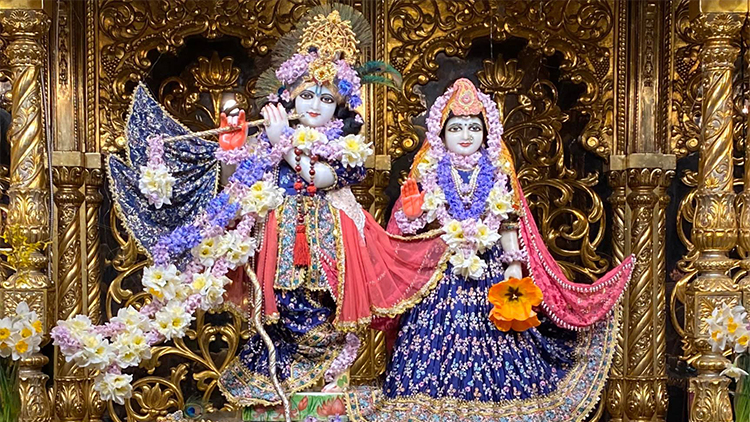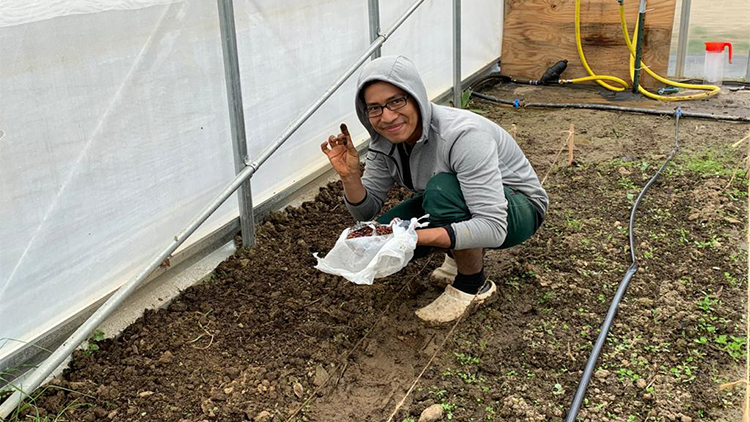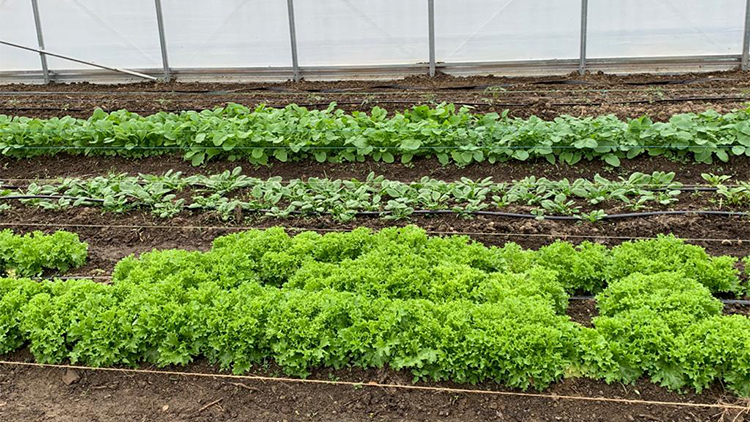New Vrindaban Scales Down to Core Personnel, Appeals to Devotees to Follow COVID-19 Guidelines
By Madhava Smullen | Апр 10, 2020

With temples all over the world dealing with the effects of COVID-19, ISKCON’s first farm community – New Vrindaban in West Virginia – has scaled down to core personnel and closed its doors to the public.
A much larger operation than many city temples, New Vrindaban has 2,200 acres, has been established as a foremost place of pilgrimage in North America, and welcomes 35,000 visitors per year with a 5% annual increase.
This also means a large staff to keep everything going. “At the start of the outbreak, we had sixty plus people doing various services, and would have had more than 100 engaged full-time by the peak of the summer season,” says communications director Anuradha Dasi. “Unfortunately, now we can only keep on pujaris and preachers full-time. We have twelve pujaris maintaining the worship of our many Deities. All other departments – accounting, communications, HR, purchasing, administration, etc – have been reduced to just a few hours a day.”
With a stay-at-home order issued in West Virginia, ISKCON New Vrindaban has closed down Prabhupada’s Palace, the Palace Lodge, and Govinda’s restaurant, losing half its income in the process.
“In order to survive, we’re having to rely on donations from longtime friends of New Vrindaban,” says Anuradha.
The community has also had to cancel all its events, including Sacinandana Swami’s Living Name Retreat, Festival of Inspiration, several major weddings, and many spring seminars designed to fulfill Srila Prabhupada instruction for New Vrindaban to become a center for spiritual education.
Sri Sri Radha Vrindabanchandra’s temple has been closed to the public, but remains open only to temple residents and devotees living on the property, and only between 5am and 9am. These conditions fall within state guidelines and protect the devotees living in the men’s and women’s ashrams.
All but one of the many entrances to the temple are closed, and a large sign at the door reminds devotees to pause, wash their hands with disinfectant soap in the sink provided before they enter, and practice social distancing. (Remaining at least six feet away from each other) Only about ten to fifteen devotees attend the programs, spread out in the vast temple room.
At least twice a day, everything that people touch in the temple room – the altar gates, chairs, musical instruments, microphone etc – is carefully sanitized.
Prasadam is only cooked in the temple for temple residents, and those actively doing service at the time.
Otherwise, devotees are asked to stay at home unless attending the temple during the specified morning hours.
So far, no New Vrindaban community members have tested positive for COVID-19, and there are only five cases in the surrounding Marshall County. However, there are 345 cases in the state of West Virginia, and ISKCON New Vrindaban leaders are appealing to all community devotees to take the situation seriously and follow all government guidelines, as well as the temple’s own guidelines listed above.
“If devotees do not follow these recommendations, we may have to shut the temple down completely,” says Anuradha.
Temple leaders request any devotees traveling back to New Vrindaban from international or national destinations to self-isolate for at least two weeks.
They also ask devotees to sign up for the ISKCON New Vrindaban mailing list, which will regularly send out important information. This includes a two-page pack that will be distributed via email, physical copy and social media, and posted in strategic spots around the temple. On one page will be a list of guidelines, directions to the CDC website, and the address of the nearby MedExpress urgent care center dedicated to Coronavirus testing. On the other will be contact numbers for the temple administration, ambulance, 911, police, and fire marshall, as well as specific addresses for various parts of the community so that devotees can direct emergency services exactly where to go.
“Our devotee care person is staying on for about ten hours a week, and is checking in with devotees to see what they need,” Anuradha says. “We can arrange for temple staff to do errands for older devotees, and shop for multiple people at a time. We’re also discussing what other things we can do for the community.”
Meanwhile Jaya Krsna Das, local GBC Zonal Supervisor and interim director at ISKCON New Vrindaban, will be sending out a daily newsletter. This will include resources for children, a prayer, news about what’s happening in New Vrindaban, pictures of Deities and local nature, and some uplifting or spiritually enlivening words. The newsletter will also share material from the GBC Strategic Planning Team, which is disseminating further resources for devotees such as curated, reliable information on COVID-19, and links to virtual sangas.
“We’re asking New Vrindaban community members to contribute to the daily newsletter in writing, services, or kirtans,” Anuradha says.
To add to the growing list of virtual offerings for devotees during COVID-19, ISKCON New Vrindaban is livestreaming its morning program every day; while Srila Prabhupada disciple Malati Devi Dasi is reading every evening from the Ramayana, interspersed with stories of Srila Prabhupada and some philosophy. Both are available to watch on Mayapur.tv. and the New Vrindaban Facebook page.
Another exciting offering comes from Sacinandana Swami, whose Living Name Retreat has been postponed until Autumn (new dates will be announced soon). As a consolation, Maharaja will give a webinar on Saturday April 11th from 8 to 10am EST to encourage devotees in their chanting, and help them delve deeper into their relationship with the Holy Name. Viewers can tune in via the Living Name Retreat’s Facebook page.
“We also had an amazing online festival for Rama Navami,” says Anuradha. “It was going to be our big donor appreciation weekend, where we would invite our donors to come and stay for free for the weekend, and offer them lots of wonderful activities. So we did it online instead. From 5am till 12:30pm, we streamed the morning program, had people write in, and had pujaris offer abisekha to the Deities or sit in the yajna on their behalf. We really tried to create a mood where people didn’t feel like they were missing out on Rama Navami, and were still getting the spiritual benefit of the festival.”
Meanwhile, with NPR recently reporting that more people are growing vegetable gardens during COVID-19, New Vrindaban’s simple living wing ECO-Vrindaban is now operating three high tunnel greenhouses. These allow devotees to offer locally grown flowers and vegetables to Sri Sri Radha Vrindabanchandra and the temple kitchens all year round.

Bhakta David plants vegetables in the ECO-Vrindaban high tunnels
In addition, pujaris have been encouraged to pick wild flowers from the surrounding areas, and community members are growing their own vegetable gardens.
“ECO-Vrindaban is trying to encourage residents to grow their own gardens, and become more self-sufficient,” Anuradha says.
In closing, ISKCON New Vrindaban management once again implores devotees to follow all government-recommended precautions to protect not only themselves but also others, offering up a quote from Srila Prabhupada to illustrate that devotees can be affected by Coronavirus just as much as everyone else.
“So long as you are in the material world, you cannot neglect physical laws,” ISKCON’s Founder-Acharya says in the book Perfect Questions, Perfect Answers. “Suppose you go to a jungle and there is a tiger. It is known that it will attack you, so why should you voluntarily go and be attacked? It is not that a devotee should take physical risk so long as he has a physical body. It is not a challenge to the physical laws: ‘I have become a devotee. I challenge everything.’ That is foolishness.”
While the COVID-19 pandemic is forcing devotees to associate via words – “vani” – rather than physically – “vapu” – there is a silver lining. Firstly, there’s the scriptural injunction that the vani, or teachings, of saintly persons are more important than their vapu. Secondly there is the possibility that such a situation may actually be increasing sanga and preaching.

Vegetables growing in one of ECO-Vrindaban’s three high tunnels
“It’s pushing us to transform technology and utilize it in Krishna’s service using the principle of yukta vairagya,” Anuradha explains. “Many senior devotees are saying that they are actually more engaged in preaching now during COVID-19 isolation than they were before. And there are more sanga opportunities than ever. So let’s use the extra time many of us have to attend classes online, preach, and learn new things. Instead of going out, let’s use this time to delve inwards.”
* * *
Watch live New Vrindaban morning programs and Malati Devi’s readings here: https://www.facebook.com/newvrindaban108/
Attend Sacinandana Swami’s Living Name Retreat Webinar on April 11th here: https://www.facebook.com/LivingNameRetreat/















